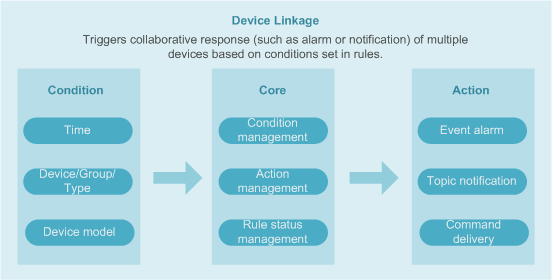Rule Engine
The rule engine function allows you to set rules for devices connected to the IoT platform. If the conditions set in a rule are met, the IoT platform triggers the corresponding action. Device linkage and data forwarding rules can be created.
Device linkage rule
Device linkage is triggered by condition. Based on preset rules, the IoT platform triggers collaborative response of multiple devices to implement device linkage and intelligent control. If Topic notification is selected for Action Type in a rule, the IoT platform works with the Simple Message Notification service of HUAWEI CLOUD to set and deliver topic notification messages.
For example, when the battery level of a water meter is less than or equal to 20%, a low-battery alarm is reported. In this way, you can replace the battery in time.

Data forwarding rule
- Works with Data Ingestion Service (DIS) (coming soon) to enable efficient data collection, transmission, and distribution. You can download data by using the SDKs or APIs provided by DIS. You can also use dump tasks to forward data to Object Storage Service (OBS), MapReduce, CloudTable, Data Warehouse Service (DWS), and Data Lake Insight (DLI) for subsequent data processing, such as data storage and analysis.
- Works with DMS to provide message queues for device data. DMS is a message middleware service based on distributed, highly available clusters. The IoT platform functions as a producer to send messages to the DMS message queue. Your applications consume messages from the message queue. In this way, messages can be transmitted between multiple application components.
- Works with OBS to persistently store device data. (The IoT platform can store device data for 7 days). OBS is an object-based massive storage service that provides massive, secure, reliable, and low-cost data storage capabilities. It can archive, back up, and store data reported by devices. OBS can work with Cloud Stream (CS) (coming soon) to analyze data flows in real time. The analysis result is used for data visualization for other cloud services or third-party applications.

Feedback
Was this page helpful?
Provide feedbackThank you very much for your feedback. We will continue working to improve the documentation.See the reply and handling status in My Cloud VOC.
For any further questions, feel free to contact us through the chatbot.
Chatbot





